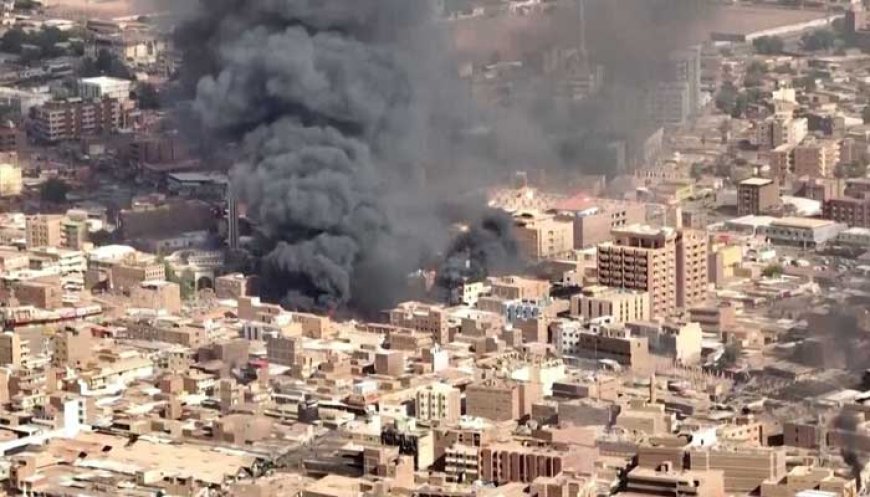At least 56 people killed in Sudan market attack

1. Shells hit in middle of vegetable market, that's why victims, wounded are so many," says survivor
Deadly Shelling and Airstrikes Kill 56 in Khartoum Amid Intensifying Sudan Conflict
Port Sudan: At least 56 people were killed across greater Khartoum on Saturday as artillery shelling and airstrikes ravaged the city, according to medical sources and activists. The violence marks yet another tragic episode in Sudan’s ongoing war.
Since April 2023, Sudan’s regular army and the paramilitary Rapid Support Forces (RSF) have been locked in a brutal power struggle. This month, the fighting has escalated as the army pushes to regain control of the capital.
Market Massacre in Omdurman
RSF shelling in army-controlled Omdurman, part of greater Khartoum, struck a busy market, killing 54 people and injuring 158. The attack overwhelmed Al-Nao Hospital, one of the last functioning medical facilities in the area, according to medical sources and the health ministry.
"The shells landed in the heart of the vegetable market, which is why so many people were killed or wounded," a survivor told AFP.
The RSF has denied responsibility, but Doctors Without Borders (MSF) described the aftermath as "utter carnage."
Airstrikes in Khartoum
Across the Nile in Khartoum, an airstrike in an RSF-controlled district killed two civilians and injured dozens, according to the Emergency Response Room, a volunteer group coordinating emergency aid. While the RSF has used drones in attacks—including on Saturday—the Sudanese army remains the only force conducting airstrikes.
Both sides have been accused of targeting civilians and indiscriminately shelling residential areas. The war has claimed tens of thousands of lives, displaced over 12 million people, and crippled Sudan’s fragile infrastructure, leaving most hospitals nonfunctional.
Hospitals Overwhelmed
MSF General Secretary Chris Lockyear, who was at Al-Nao Hospital during the attacks, described a harrowing scene:
"The morgue is full of bodies. I see men, women, and children whose lives have been torn apart, with injured people filling every possible space in the emergency room as medics struggle to cope," he said.
A hospital volunteer told AFP that Al-Nao is facing severe shortages of essential supplies, including shrouds, blood donors, and stretchers for transporting the wounded. The hospital has been repeatedly attacked throughout the conflict.
The Sudanese doctors' union reported that one shell landed just meters from the hospital, killing mostly women and children. The union has issued an urgent call for medical personnel to help address the acute shortage of staff.
Escalation of Fighting
The latest bloodshed comes amid a broader army offensive across central Sudan. After retaking Wad Madani, the capital of Al-Jazira state, army forces have now turned their focus to Khartoum.
Although the RSF still controls the road between Wad Madani and Khartoum, the army-allied Sudan Shield Forces claimed on Saturday to have seized the towns of Tamboul, Rufaa, Al-Hasaheisa, and Al-Hilaliya, about 125 kilometers (77 miles) southeast of the capital.
Led by Abu Aqla Kaykal, a former RSF commander who defected last year, the Sudan Shield Forces have been accused of committing atrocities—both during Kaykal’s time with the RSF and in his current alliance with the army.
Sudan remains deeply divided, with the RSF holding most of Darfur and southern regions, while the army controls the east and north.
Counter-Offensive and Civilian Toll
After months of deadlock, the army has recently broken RSF sieges on several key military bases, forcing paramilitary fighters to retreat to the outskirts of the city. Witnesses reported that Saturday’s bombardment of Omdurman came from the western outskirts, where RSF fighters remain entrenched.
The attack followed a speech by RSF commander Mohamed Hamdan Daglo, who vowed to retake the capital. “We expelled them from Khartoum before, and we will do it again,” he declared in a rare video address.
Greater Khartoum has been the epicenter of the nearly 22-month-long war, with entire neighborhoods occupied by warring factions. A study by the London School of Hygiene and Tropical Medicine estimates that 26,000 people were killed in the capital alone between April 2023 and June 2024.
At least 3.6 million civilians have fled, according to the United Nations, while those remaining face constant artillery fire and severe food shortages. Many neighborhoods are under siege, blockaded by opposing forces.
The UN-backed Integrated Food Security Phase Classification warns that at least 106,000 people in Khartoum are suffering from famine, with an additional 3.2 million at crisis levels of hunger.
Nationwide, famine has already been declared in five regions—mostly in Darfur—and is expected to spread to five more by May.
This version keeps the core details intact while improving readability and flow. Let me know if you'd like any further refinements!


















































